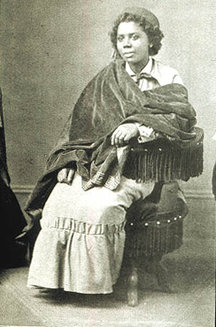Edmonia Lewis
Born: July 14, 1845 (Greenbush in Rensselaer County, New York); Death: No record of her death was ever recorded (Est. 1909)
The amazing talent of Edmonia Lewis can only leave one speechless. Her father was African-American, and her mother was part Native American from the Mississauga Tribe of the Chippewa Nation. When her parents died early on in Edmonia’s life, she was raised as a Mississauga Indian with the culture and values of the Chippewa Nation. By 1858, Edmonia left her Native American environment for a life at the preparatory department at Oberlin College in Ohio. Oberlin College was the Mecca for staunch abolitionists and Christian advocates. Edmonia was a live-in boarder with the Reverend John Keep, a theologian at Oberlin. She was also there when, on October 1859, JOHN BROWN and two African-Americans from Oberlin were involved in the HARPER’S FERRY arsenal raid. While continuing her studies at Oberlin, young Edmonia was falsely accused in two cases involving students linking her to college infractions. She was forced to leave Oberlin, but she was never expelled. Her talents were already recognizable, therefore she moved to Boston and started her first lessons in modeling clay under the tutelage of sculptor, Edward Brackett. Edmonia Lewis was determined to become a recognizable sculptor. Her big challenge came when, upon the death of Colonel ROBERT GOULD SHAW, the leader of the all black Fifty-Fourth Massachusetts Regiment at FORT WAGNER, South Carolina, she completed a marble bust from her memory and his photograph. Edmonia Lewis, who now worked near the inspirational black artist EDWARD M. BANNISTER, also sold plaster reproductions of Shaw, with the consent of his family, to help raise funds for the underpaid black Union Soldiers. At the end of the Civil War, Lewis went to Italy to study and work with other sculptors and artists involved in the purist reproduction of the Neoclassical art forms. In ROME, Lewis was able to meet many prominent American writers. Among them were Nathaniel Hawthorne, Henry Wadsworth Longfellow, and Harriet Beecher Stowe. Edmonia Lewis was destitute but determined to produce works of art in marble. After two years of work in ROME, she completed FOREVER FREE in marble (1867-68) and shipped it to America and had to literally beg for the cost of the marble and shipping fees from her American friends and aids. Edmonia Lewis was determined to buck the “odds” — she was a woman and a black artist — nevertheless, she endured. Edmonia Lewis’ greatest fear was that people would say she did not create those works of art. This fear made her undaunted, and she drew curious onlookers to her studio as she did all the physical, heavy work as a woman sculptor. Edmonia Lewis’ last known exhibition was in the UNITED STATES CENTENNIAL EXPOSITION in Philadelphia in 1876 and Chicago in 1878.

